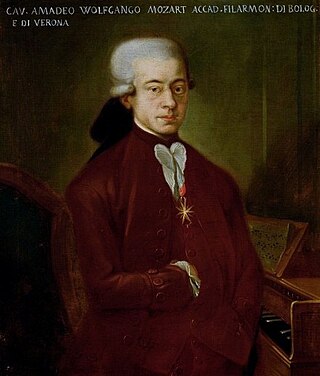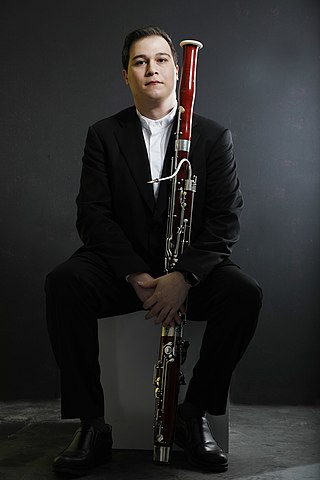
The Bassoon Concerto in B-flat major, K. 191/186e, is a bassoon concerto written in 1774 by Wolfgang Amadeus Mozart. It is the most often performed and studied piece in the entire bassoon repertory. Nearly all professional bassoonists will perform the piece at some stage in their career, and it is probably the most commonly requested piece in orchestral auditions – it is usually requested that the player perform excerpts from the concerto's first two movements in every audition.

Bill Douglas is a Canadian musician, composer, pianist, and bassoonist whose works received influence from classical music, jazz, African, Brazilian and Indian music, 1970s funk and many other genres.

William Waterhouse was an English bassoonist and musicologist. He played with notable orchestras, was a member of the Melos Ensemble, professor at the Royal Northern College of Music, author of the Yehudi Menuhin Music Guide "Bassoon", of The New Langwill Index, and contributor to the New Grove Dictionary of Music and Musicians.
Carl Maria von Weber's Concerto for Bassoon in F Major, Op. 75 was composed in 1811 for Munich court musician Georg Friedrich Brandt, was premiered on December 28, 1811, and then revised in 1822. Primarily an opera conductor and composer, Weber had only arrived a few months earlier in Munich, where he was extremely well received. The concerto is one of two pieces written for bassoon by Weber, the other being Andante e Rondo Ungarese, Op. 35. A typical performance lasts 18–20 minutes.
Valery Popov is a Russian bassoonist, described as the foremost of his era in Russia in his Grove Music Online entry.

Graham Waterhouse is an English composer and cellist who specializes in chamber music. He has composed a cello concerto, Three Pieces for Solo Cello and Variations for Cello Solo for his own instrument, and string quartets and compositions that juxtapose a quartet with a solo instrument, including Piccolo Quintet, Bassoon Quintet and the piano quintet Rhapsodie Macabre. He has set poetry for speaking voice and cello, such as Der Handschuh, and has written song cycles. His compositions reflect the individual capacity and character of players and instruments, from the piccolo to the contrabassoon.

Gestural Variations, Op. 43, is a trio composition by Graham Waterhouse in 1997 originally for oboe, bassoon and piano. Later versions are scored for clarinet, cello and piano (1999) and flute, cello and piano (2009).

The Bassoon Quintet is a quintet by Graham Waterhouse, composed in 2003 for bassoon and string quartet.
Lyndon Jeffrey Frank Watts is an Australian bassoonist. He is principal bassoonist of the Münchner Philharmoniker and an academic teacher.

Epitaphium is a composition for string trio by Graham Waterhouse. In 2007, after the death of his father William Waterhouse, he composed Epitaphium in Memoriam W.R.W. as a tribute to his memory.

Bright Angel is a composition for three bassoons and contrabassoon by Graham Waterhouse. It was composed in 2008 for the annual conference of the International Double Reed Society (IDRS).
Julie Price is an English bassoonist. She is principal bassoonist of the BBC Symphony Orchestra.
Victor Bruns was a German composer and bassoonist. He played with the Leningrad Opera, the Volksoper Berlin and the Staatskapelle Berlin. As a composer, he is known for his ballets and for bassoon concertos and sonatas.

Mouvements d'Harmonie op. 29 is a composition in one movement for wind ensemble, written by Graham Waterhouse in 1991, dedicated to William Waterhouse. It was first performed on 24 May 1991 in the Purcell Room, London. The piece was published in 2000 by Accolade, Holzhausen. It was recorded by Endymion in 2002 on a composer portrait CD.
Ronald James Klimko was an American bassoonist, author, composer, teacher, and performer.
Christopher White is an English classical pianist, musicologist and repetiteur. He plays internationally, not only the standard classical and romantic repertory, but also premieres of new music. He made a transcription of four movements of Mahler's unfinished Tenth Symphony for piano, playing and recording the work.

Alireza Motevaseli is an Iranian musician.
Pascal Gallois is a French bassoonist, conductor and music teacher, specialising in contemporary classical music.
Elisabeth Waterhouse is an English pianist and music pedagogue. She founded the National Chamber Music Course, a summer school for young string players, in 1974, and has managed it since. She is the widow of the bassoonist and musicologist William Waterhouse.






